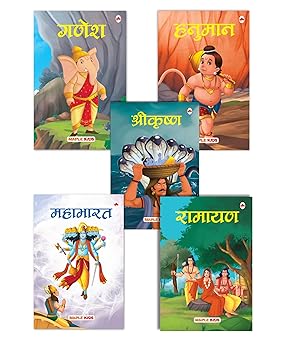शीर्षक: महाभारत से सिखने योग्य पाठ - आधुनिक जीवन के लिए ज्ञान
प्रस्तावना: महाभारत, हिन्दू पौराणिक कथाओं में से एक, केवल प्राचीन हीरोज और देवताओं की कहानी नहीं है; यह समय की अद्वितीय ज्ञान की खजानी है, जो आधुनिक जीवन के लिए मूल्यवान सबक प्रदान करता है। इस भव्य कथा को महर्षि व्यास ने रचा है, और यह समय और संस्कृति की सीमाओं को पार करके मानव मनोबल और जटिल नैतिक और नैतिक दिलमें समर्पित करता है। इस ब्लॉग में, हम महाभारत से वो गहरे सबक खोजेंगे जो आधुनिक जीवन में महत्वपूर्ण हैं, और आज की दुनिया में मार्गदर्शन और उपदेश प्रदान करते हैं।
1. धर्म - नैतिक कॉम्पास: महाभारत धर्म के अधिकार में है, जिसे नैतिकता या दायित्व के रूप में अनुवाद किया जा सकता है। इसका मुख्य प्रश्न यह है, "एक दिए गए स्थिति में सही क्रिया क्या है?" इस नैतिक दुविधा का प्रतीक अर्जुन के रूप में है, जो युद्धभूमि पर नैतिक संकट का सामना करते हैं। यहां का सबक यह है कि व्यक्ति को विपरीतता के बावजूद अपने धर्म का पालन करना चाहिए, और नैतिक मूल्यों को जीवन के निर्णयों का मार्गदर्शन करने के लिए आनंदित करना चाहिए।
2. अहंकार और लालच के परिणाम: पाण्डवों और कौरवों के बीच के प्रतिस्पर्धा, अहंकार, ईर्ष्या और लालच के साथ, एक भयानक युद्ध की ओर बढ़ती है। महाभारत एक सतर्कता कथा के रूप में निरंतर इच्छाशक्ति की अत्यधिक ताकत के साथ अनावश्यक इच्छाओं की विनाशकारी शक्ति के बारे में सतर्क करती है, और जीवन में विनम्रता और संतोष के महत्व को दिखाती है।
3. वफादारी और धोखाधड़ी: महाभारत जैसे संघर्ष की जटिल भूमिकाओं को चित्रित करता है, जिसमें वफादारी और धोखाधड़ी शामिल हैं। कर्ण के चरित्र का, जो जानते हुए भी सही मार्ग को न जानते हुए दुर्योधन के प्रति वफादार रहता है, उपयोग उद्घाटन करता है कि हमें अपने निष्ठाओं का जुदा चुनना है और वफादारी के नाम पर अपने सिद्धांतों को बदलने का काम नहीं करना चाहिए।
4. महिलाओं की भूमिका: महाभारत अपनी महिला पात्रों के आवाज़ों और संघर्षों को महत्वपूर्ण बनाता है, जैसे कि द्रौपदी और गांधारी, जो अत्यधिक पीड़ा को सहती हैं। यह महत्वपूर्ण बताता है कि लिंग समानता का महत्व है और महिलाओं को दबाने वाले समाजिक नियमों को चुनौती देने और उन्हें दुर्विनय करने की आवश्यकता है।
5. क्षमा की मूल्य: युद्ध के बाद अपने दुश्मनों को क्षमा करने की कहानी युधिष्ठिर की शक्ति को प्रमाणित करती है और साबित करती है कि एनिमिटी को पकड़े रखने और प्रतिशोध लेने से केवल पीड़ा बढ़ती है, और क्षमा आंतरिक शांति की ओर पहुँचने का मार्ग है।
6. अच्छा और बुरा का जटिलता: महाभारत अच्छा और बुरा के बीच की रेखाओं को मिटा देता है, हमें याद दिलाता है कि व्यक्तियों पूरी तरह से धार्मिक या दुष्मन नहीं होते हैं। यह हमें मानव प्राकृतिक में ग्रे की शैली को देखने के लिए और नैतिक निर्णयों के प्रति सभाव और सहानुभूति के साथ पहुंचने की शिक्षा देता है।
7. नैतिक और नैतिक नेतृत्व का महत्व: युद्धिष्ठिर और भगवान कृष्ण के पात्रों में न्यायमूलक और नैतिक नेतृत्व की गुणवत्ता प्रतिष्ठित है। उनका ज्ञान, ईमानदारी, और धर्म के प्रति समर्पण हर किसी युग में प्रभावी और नैतिक नेतृत्व की मॉडल के रूप में काम करता है।
निष्कर्षण: महाभारत केवल एक साहित्यिक श्रेष्ठता नहीं है, बल्कि जीवन के सफर में यथार्थ गुरुजन की तरह दिनों के बीच की जीवन के सभी प्रकार के उपदेश भी है, जिनका मानवता के साथ अदृश्य गहरे संबंध है। इसे हम इस महाकाव्य की कथाओं और पात्रों में खोजकर, नैतिक चुनौतियों का सामना करने, करुणा को बढ़ावा देने, और एक मानव और नैतिक जीवन जीने के लिए मूल्यवान दर्शन खोज सकते हैं।
Introduction to Lessons from Mahabharata
Significance of the Mahabharata
The Mahabharata offers timeless lessons on dharma, ethics, duty, and human behavior that are relevant even today.
Understanding Human Nature
The epic explores complex human emotions such as ambition, envy, loyalty, and courage through its characters.
Relevance in Modern Life
Lessons from the Mahabharata can guide individuals in making ethical decisions and managing relationships today.
Moral and Ethical Teachings
The Mahabharata emphasizes righteousness, justice, and responsibility as central pillars of human conduct.
Why Study These Lessons
Studying the Mahabharata helps individuals understand consequences of actions and the importance of moral choices.
Lessons on Dharma
Dharma in Everyday Life
The Mahabharata teaches how to uphold righteousness in personal, social, and professional life.
Dharma and Justice
Through Yudhishthira and other characters, the epic shows the importance of fairness and justice in society.
Dharma in Difficult Situations
The epic demonstrates how to make ethical decisions even under pressure or moral dilemmas.
Lessons from Arjuna's Choices
Arjuna’s struggles highlight the importance of duty, self-reflection, and following righteous paths.
Impact of Following Dharma
Adhering to dharma ensures peace, prosperity, and moral integrity in personal and societal life.
Lessons on Leadership
Leadership Qualities
The Mahabharata provides examples of leadership, emphasizing courage, wisdom, and accountability.
Lessons from Yudhishthira
Yudhishthira demonstrates patience, fairness, and moral strength in leading his kingdom.
Lessons from Bhishma
Bhishma’s life teaches loyalty, commitment, and the importance of serving a greater cause.
Lessons from Krishna
Krishna exemplifies strategic thinking, guidance, and spiritual leadership in crucial situations.
Leadership in Crisis
The Mahabharata shows how leaders must remain calm, decisive, and ethical during conflicts.
Lessons on Relationships
Family and Friendship
The epic highlights the importance of loyalty, respect, and understanding in family and friendships.
Handling Conflicts
It teaches how to manage disputes with patience, wisdom, and diplomacy.
Support and Sacrifice
Characters demonstrate the value of supporting loved ones and making sacrifices for their well-being.
Trust and Loyalty
The Mahabharata emphasizes trust, loyalty, and honesty as the foundation of strong relationships.
Learning from Mistakes
The epic shows how recognizing and learning from mistakes strengthens bonds and promotes growth.
Spiritual and Philosophical Lessons
Concept of Karma
The Mahabharata explains that every action has consequences, and individuals must act responsibly.
Concept of Bhakti
Devotion to God, as shown by characters, provides guidance, strength, and inner peace.
Understanding Life and Death
The epic discusses the transient nature of life and the importance of righteous living.
Self-Discipline and Control
Characters like Arjuna highlight the value of self-control, discipline, and focus in life.
Philosophical Wisdom
The Mahabharata conveys wisdom on ethics, duty, spirituality, and the path to liberation.
The Mahabharata offers timeless lessons on dharma, ethics, duty, and human behavior that are relevant even today.
The epic explores complex human emotions such as ambition, envy, loyalty, and courage through its characters.
Lessons from the Mahabharata can guide individuals in making ethical decisions and managing relationships today.
The Mahabharata emphasizes righteousness, justice, and responsibility as central pillars of human conduct.
Studying the Mahabharata helps individuals understand consequences of actions and the importance of moral choices.
The Mahabharata teaches how to uphold righteousness in personal, social, and professional life.
Through Yudhishthira and other characters, the epic shows the importance of fairness and justice in society.
The epic demonstrates how to make ethical decisions even under pressure or moral dilemmas.
Arjuna’s struggles highlight the importance of duty, self-reflection, and following righteous paths.
Adhering to dharma ensures peace, prosperity, and moral integrity in personal and societal life.
The Mahabharata provides examples of leadership, emphasizing courage, wisdom, and accountability.
Yudhishthira demonstrates patience, fairness, and moral strength in leading his kingdom.
Bhishma’s life teaches loyalty, commitment, and the importance of serving a greater cause.
Krishna exemplifies strategic thinking, guidance, and spiritual leadership in crucial situations.
The Mahabharata shows how leaders must remain calm, decisive, and ethical during conflicts.
The epic highlights the importance of loyalty, respect, and understanding in family and friendships.
It teaches how to manage disputes with patience, wisdom, and diplomacy.
Characters demonstrate the value of supporting loved ones and making sacrifices for their well-being.
The Mahabharata emphasizes trust, loyalty, and honesty as the foundation of strong relationships.
The epic shows how recognizing and learning from mistakes strengthens bonds and promotes growth.
The Mahabharata explains that every action has consequences, and individuals must act responsibly.
Devotion to God, as shown by characters, provides guidance, strength, and inner peace.
The epic discusses the transient nature of life and the importance of righteous living.
Characters like Arjuna highlight the value of self-control, discipline, and focus in life.
The Mahabharata conveys wisdom on ethics, duty, spirituality, and the path to liberation.


